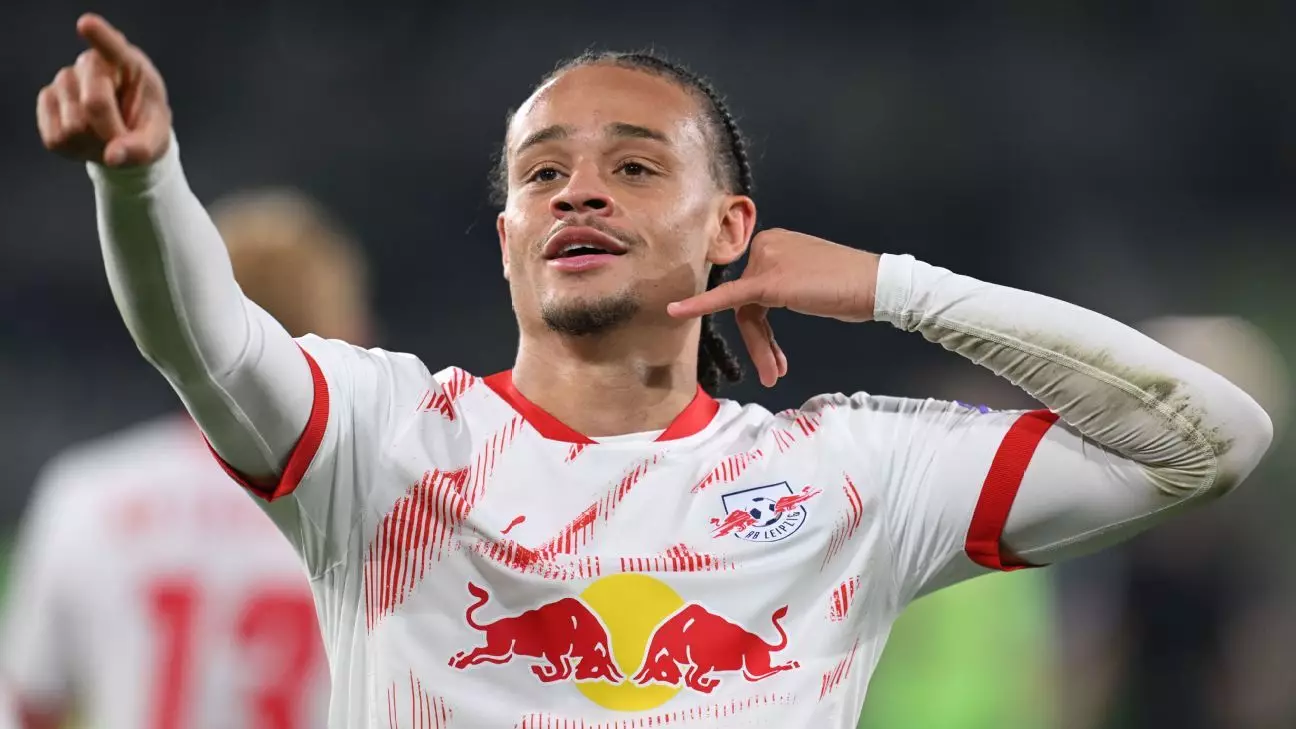Manchester United appears to be on the brink of an exciting altitudinal shift as they set their sights on Xavi Simons, the 21-year-old attacking midfielder currently thriving at RB Leipzig. With a promising tally of 14 goals in just 21 Bundesliga appearances this season, Simons has quickly become a target for several top clubs. The Red Devils, however, see him as a vital piece of their squad rebuild under a new strategic vision. While the club faces competition from rivals such as Liverpool and Manchester City, the key to courting Simons lies in securing a place in the UEFA Champions League, an objective that may hinge on their performance in the ongoing Europa League. The stakes are high, but United’s determination to integrate talent like Simons points to a more ambitious future where star players bolster their competitive edge.
The allure of Simons extends beyond his impressive record. He embodies a modern midfielder with a unique blend of technical skill and tactical awareness, essential for manager Ruben Amorim’s system. Bringing him on board would not only signal Manchester United’s intent but might also rejuvenate their creative play, potentially transforming them into a formidable attacking force capable of challenging for top honors in both domestic and European competitions.
Barcelona’s Defensive Reinforcements with Jonathan Tah
On the other end of the spectrum, Barcelona is looking to solidify their backline with the acquisition of Bayer Leverkusen’s Jonathan Tah. Known for his commanding presence and robust defensive capabilities, the 29-year-old German international is set to be a critical component for the Blaugrana as they seek to reinforce their defense. With previous successes in the attack, this shift toward defensive security mirrors Barcelona’s desire to evolve into a more balanced team capable of withstanding the rigors of modern football.
As Tah approaches the final stages of his contract, Barcelona’s efforts to secure a pre-contract agreement represent a strategic move in the transfer market, allowing them to acquire talent without the hefty price tag typically associated with big-name signings. This approach deviates from the traditional model of extravagant spending, instead opting for shrewd maneuvering that could improve their squad without financial strain. In an era where financial prudence is as crucial as ever, this could be a game-changing strategy for Barcelona.
The Rising Stars and Strategic Moves
Meanwhile, RB Leipzig is keen on capitalizing on the potential of Southampton’s rising star, Tyler Dibling. The 19-year-old winger represents the future of football, and Leipzig’s lead in the race to snag him showcases their commitment to development. Competing clubs like Bayern Munich and Tottenham Hotspur don’t intimidate them, as they appear ready to negotiate the substantial fees typically associated with transfers for young talent. Southampton’s adjustment to a lower valuation suggests that Dibling may soon be donning the colors of a Bundesliga giant, and it’s indicative of Leipzig’s broader strategy of blending experienced players with youthful prospects. This synthesis could yield a generation of talent that not only elevates the club but also revitalizes the league’s competitiveness.
Internal Stability: Bayern Munich’s Goretzka Decision
Bayern Munich’s Leon Goretzka, despite being a subject of interest from Manchester United, seems to be firmly rooted in his current situation. The midfielder’s desire to stay at the Allianz Arena reflects a sense of stability and commitment that is becoming rare in today’s football landscape. With a contract that lasts until 2026, he appears to be placing his trust in the club’s direction under Vincent Kompany, underscoring a broader trend of players prioritizing loyalty and culture over financial gain. This situation highlights an essential balance in football: the simultaneous pull of ambition and stability that clubs must navigate in their pursuit of success.
Juventus and Chelsea’s Renegotiation of Young Talent
In Italy, Juventus aims to fast-track the permanent signing of Chelsea’s Renato Veiga, adding yet another layer to the dynamic transfer saga. The urgency to finalize Veiga’s transfer before the FIFA Club World Cup reflects Juventus’s strategy of embedding new talent into the squad as swiftly as possible. However, their challenge lies in negotiating Chelsea’s €50 million asking price, a classic tale of financial negotiation that will determine Veiga’s future. This will not only impact Juventus’s immediate plans but also shape the club’s long-term vision as they contend with an evolving footballing landscape. The need for clubs to balance immediate needs with future potentials is more pressing than ever, and Veiga’s situation exemplifies the intricacies of modern football transfers.

